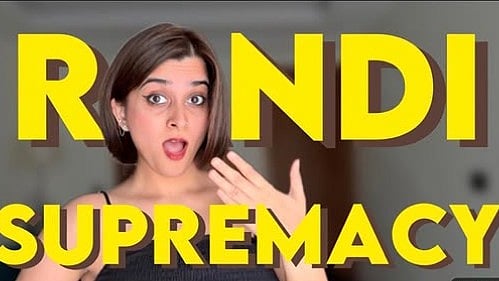'Proud R***i': What Started This Online Revolution That Is Shaking The Indian Media
Therapist Divija Bhasin’s viral “proud ra**i” Instagram video has sparked a major debate in India about reclaiming misogynistic slurs. While many women celebrate the movement as empowering and a stand against online abuse, critics argue it risks normalising harmful language and erasing trauma linked to the insult. Legal complaints and heated public reactions continue to intensify the conversation

When therapist and content creator Divija Bhasin hit “record” on her Instagram Reel earlier this month, she probably didn’t expect to ignite a national firestorm. In that viral video, now seen by millions- she challenged one of the most misogynistic Hindi slurs: “rai.”** Rather than cower under its weight, she declared: “I am a proud Rai. Rai supremacy.” With that, she launched what many are calling the #ProudRai** or “Ra**i Revolution.”
Bhasin told her followers she regularly sees that word in her comment-used to shame her for being outspoken, independent, and confident. Over time, its sting faded. So she flipped the script: instead of letting others define her, she chose to own the label herself.
For her, reclaiming “ra**i” isn’t about glorifying sex work, it’s about resisting the shame historically attached to it. She argues that calling women this term has always been a way to control them, to silence them. By embracing it, she takes away the power that abusers once wielded. In a post she made, her caption was titled, "We didn’t give ourselves the title of randi. We were already given it by the society. We just took away their power. And that’s why my video is uncomfortable to see."
A movement takes root
Her message resonated. Thousands of women began using #ProudRai** on their Instagram profiles, transforming a derogatory word into a mark of collective defiance. Some people picked it simply in solidarity; others saw it as a personal balm, a way to heal from deep-seated verbal abuse.
There were stories shared in response: girls who were called the word by family members, even as children. For many, Bhasin’s act of reclaiming that language felt like permission to confront the emotional weight they carried in silence. Teen girls began using the hashtag 'Proud R***i' in their bios that ignited a much serious consequences.
Anger, support- and Legal fallout
But this isn’t just a warm, supportive wave. Many critics argue that Bhasin’s reclamation erases the very real trauma of those for whom the slur has been a weapon of violence, particularly sex workers. Some say she doesn’t have the right to repurpose the insult, because it carries a legacy of exploitation and marginalisation.
The debate escalated into legal threats. Complaints have been filed accusing Bhasin of encouraging minors to adopt the word. Others demanded she publicly apologise, sparking heated exchanges on social media.
Bhasin, however, remains defiant: she says she’s ready to face whatever comes next. For her, any backlash is a sign the conversation is deepenin-and that verbal abuse toward women is finally being taken seriously. She once said she’d even welcome jail time, arguing: “If I’m punished for reclaiming the word, then so should the men who used to call me that.”
A divided digital world
Online, reactions have split sharply. Supporters call her courageous, praising her decision to transform a humiliating insult into an emblem of empowerment. They see her reclamation as a powerful act of resistance: turning shame into armor.
Critics, on the other hand, caution against normalising a word with a painful history. They question whether such a reclamation can truly be inclusive-or whether it risks erasing the experiences of those who have historically borne the brunt of the abuse.
Is this social media outburst justified?
At its heart, the Ra**i Revolution is about more than just a trending hashtag: it’s a reckoning with language, gender, and power. It challenges us to ask uncomfortable questions: Can we truly reclaim a slur? Who does the reclaiming benefit, and at what cost? And most important-does ownership heal, or does it risk erasing?
Divija Bhasin’s bold declaration has sparked anger, solidarity, and intense debate. Whether people condemn or cheers her, she has undeniably forced a national conversation around verbal violence, identity, and how we define respect.
RECENT STORIES
-
-
-
-
-
